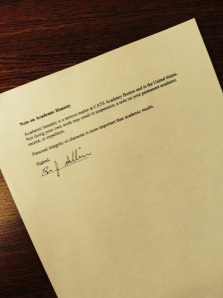Let’s be honest movies like Dead Poets Society and School Ties have a special place in the hearts of educators, and why not? On a personal note, I love the setting in both films. A boarding school nestled somewhere in New England in the middle of the century. When I watch them I am sucked in by romantic images, like students working diligently next to a crackling fire, and teachers impacting students lives. Admittedly, I also see things that make me cringe, like the use of corporal punishment in an educational environment.
I mention this because I worry that when we look to the past we allow the memories of things like corporal punishment to disproportionately skew our thinking of the future. This thinking supports a pervasive feeling in education that the old stuff can’t possibly be the best stuff. If we’re talking about paddling students for information, I’m with you! However, I feel that as academics we have a responsibility to assess the old stuff through a modern lens and evaluate.
For example: a major issue at play in School Ties is the violation of an honor code, which is signed at the start of an examination. This example raises a question: Students know there is an expectation not to cheat, so why have them sign it at the start of an exam? A more relevant question might be: What would we gain by having students continue this practice?
I know what you’re thinking, I remind my students about the consequences of cheating each time we have an assessment – that’s really good enough. Well, maybe. We know that students absorb information differently; hence the push on differentiated instruction (I know the link is Wiki, but in the moment I just want you to have an easy definition). So why not present information about cheating differently?
Furthermore, we know now that the way a person interacts with a potential behavior can impact the behavior itself. For example if you are trying to manage your diet and on the way to the lunchroom you say to yourself aloud “I will eat vegetables not cookies” you significantly increase the chances of asserting self-control. (This happens because the part of your brain that manages self-control receives additional stimulation – I’ll save the rest of the explanation for another post). So why not force them to look a temptation squarely in the face and choose a better behavior BEFORE the exam? Could that impact academic dishonestly?
So if we know students receive and process information differently, and we know that dealing with a behavior immediately before can impact performance, why don’t we try it? The reality is some are, like my colleague who inspired this post by actually having students sign an honor code before exams.
However the true question behind this post is: In the change of educational tides, are we doing a good job of keeping the good stuff and shaking off the cobwebs? I submit that before we toss aside an “ancient practice” we discipline ourselves enough to evaluate its merit using current knowledge.

